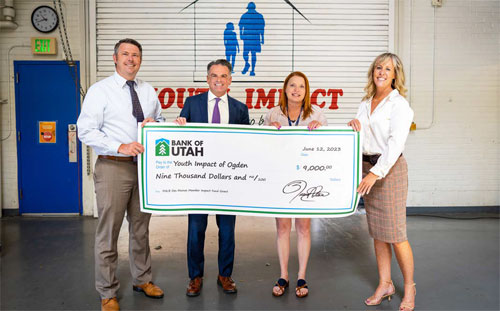![]()
It can communicate purpose, indicate what the company offers and tell where the business serves. As the business works to build its reputation, the name also becomes an identity.
 Take Bank of Utah, for example. Its name immediately conveys “Utah financial institution.” Over time — having been in the local banking industry since 1952 — the name has come to mean so much more to community members across the state. Recently, through a series of meaningful conversations with longtime customers, the bank has re-discovered just how{mprestriction ids="1,3"} important the brand is. The Bank of Utah name doesn’t just say “finances and accounts,” it signifies “familiarity, trust and service” — three hallmarks of the community banking industry.
Take Bank of Utah, for example. Its name immediately conveys “Utah financial institution.” Over time — having been in the local banking industry since 1952 — the name has come to mean so much more to community members across the state. Recently, through a series of meaningful conversations with longtime customers, the bank has re-discovered just how{mprestriction ids="1,3"} important the brand is. The Bank of Utah name doesn’t just say “finances and accounts,” it signifies “familiarity, trust and service” — three hallmarks of the community banking industry.
Community banks, such as Bank of Utah, work to understand and know their customers so they can provide products and services that truly meet their customers’ needs. They work to make strong, solid financial decisions so they can re-invest in local communities. As local businesses themselves, they also work to become experts in the local business landscape, so they can help community businesses thrive. Here’s a more detailed look into community banking and how it makes a difference in Weber and Davis counties and beyond.
The Human Connection
Community bankers know their customers. They live, work and raise their families in the same cities and towns. They focus on meeting immediate needs, anticipating future needs and educating customers on products, services and innovations that will help them achieve their financial dreams. To do that, they have to listen and build relationships with their customers and become people others can count on and trust.
Equally as important, community bankers are accessible.
A recent article from a local news source told the story of a Utahn who almost lost $10,000 to fraud while using an online financial technology service for her banking needs. Her biggest problem during the long, drawn-out incident was communicating with the company. Employees didn’t return her phone calls promptly or at all, and without a physical location to go to, she had a hard time finding someone to answer her questions.
Her most striking takeaway was, “I feel like everyone I’ve talked to is overseas, there’s no location to go to. After being hacked too, you don’t know who to trust.”
Because community banks are local, they can deliver exceptional experiences across all their platforms, including branches, online and mobile banking and telephone. Bank of Utah’s call center, for example, usually takes over 14,000 phone calls a month, every one of which is answered by a Utah-based employee.
The Local Economy Connection
 Bank of Utah, in partnership with the FHLB Des Moines, presents Youth Impact of Ogden a grant check. Funds will support the organization's ongoing efforts to provide after school programming and career-assistance to under-served youth in Weber County. This is one of 12 donations Bank of Utah was able to grant to deserving Utah non-profits from Logan to St. George as part of the FHLB program. (Pictured l-r: Bank of Utah CFO Nathan DeFries, Bank of Utah President Branden Hansen, Youth Impact Executive Director Suzy Miller, Bank of Utah Marketing Manager Cherie Hanson)
Bank of Utah, in partnership with the FHLB Des Moines, presents Youth Impact of Ogden a grant check. Funds will support the organization's ongoing efforts to provide after school programming and career-assistance to under-served youth in Weber County. This is one of 12 donations Bank of Utah was able to grant to deserving Utah non-profits from Logan to St. George as part of the FHLB program. (Pictured l-r: Bank of Utah CFO Nathan DeFries, Bank of Utah President Branden Hansen, Youth Impact Executive Director Suzy Miller, Bank of Utah Marketing Manager Cherie Hanson)Many times, larger banks take deposits in one state and lend them out in others. Community banks, on the other hand, like to invest their deposits in the neighborhoods where their depositors live and work. This creates opportunities for economic prosperity and job creation in the communities customers care about and want to see flourish.
For example, one of Bank of Utah’s recent loans to a local municipality went toward the building of a new library. This not only created construction jobs, but also provided computer and Internet access for all members of the community, and specifically made a positive impact on the low- to moderate-income populations in the area. Studies show access to technology can enable education, job training, hiring and advancement for individuindividuals and families, and that a majority of low-income adults and teens rely on libraries to use computers and the Internet.
Community banks — especially those that have been in business for a long time — are active partners in these types of community development efforts because they see just how impactful they are. They also appreciate that banks are only as strong as the communities in which they reside.
The Community Connection
Community banks are deeply involved in the areas they serve. They donate funds to support local nonprofits and charitable organizations, and employees volunteer with local groups and make a difference by serving on boards.
This year, Bank of Utah is honored to have received grant money from the Federal Home Loan Bank of Des Moines Member Impact Funds, which will allow the bank to increase its 2023 giving. The grant will match up to $3 for every dollar of Bank of Utah’s donations to 12 local nonprofits, so they can serve even more needs in communities across Utah — Weber and Davis counties included.
One of the recipients of these funds is Family Promise of Ogden, a shelter for homeless families with young children. The organization not only provides for the families’ physical needs, but also spearheads efforts to teach self-sufficiency. A number of Bank of Utah employees volunteer with Family Promise of Ogden, working to fulfill the organization’s mission by teaching financial literacy courses, being hosts at the shelters and serving on the board.
One Last Note
Because of their strong community presence and commitment to customers, community banks are thriving today. According to a recent survey by Independent Community Bankers of America (ICBA), 70 percent of Utah adults say it’s important to choose a bank based in their local community and 77 percent say it’s important that lending decisions be made by local, community banks.
The local, community banking industry remains fully committed to its customers and communities. Within that industry, the Bank of Utah name and brand is here to stay. So is the bank’s mission to leave a meaningful and lasting mark on the Beehive State.
Ben Browning is CEO of Bank of Utah and vice chairman of Bank of Utah’s board of directors. Browning is active in many industry and community organizations. He represents Utah banks on the American Bankers Association Emerging Leaders Council, and he is a founding member and chair of the Society of Bank Executives. Browning currently serves on the boards for the Hale Centre Theatre, Pacific Coast Banking School and Ogden School Foundation. He is a past board member for United Way of Northern Utah.{/mprestriction}







